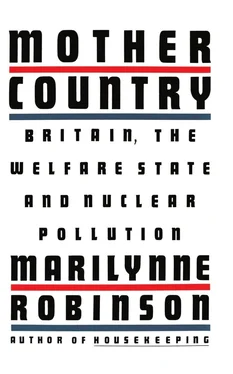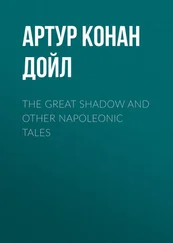The problem of how an enterprise can prosper, pouring plutonium into the world environment, when contamination of this kind is held to be among the worst potential consequences of a nuclear war, perplexes me deeply. I experience resistance from my hearers, as often as I raise the subject of Sellafield, even though I can document what I say from the most reputable British sources. An American marine biologist assures me that Britain has more naturalists per capita than any other country in the world. I am sure he is correct. This does not mean the British landscape or population enjoys an abundance of informed solicitude. It means that two apparently incompatible tendencies exist side by side. The character of Sellafield is not in dispute. And since Britain is distinguished among European nations for the degree of its contamination, both radioactive and chemical, it is perhaps appropriate to ponder the attributes of British naturalist enthusiams which permit, and disguise, an unaccountably brutal indifference to nature. This nation of birdwatchers and dahlia fanciers uses 2,4,5 T, the dioxin-contaminated defoliant banned in every other Western country because dioxin is, like plutonium, often called the most potent man-made toxin. Why should Britain go to the lengths it does to keep rabies out of the country, bothering over lap dogs, while importing chemical wastes? To the extent that dramatizing one highly controllable problem creates an impression of caution and fastidiousness in matters of public health, the illusion is dangerous. For just the same reason, those famous naturalists constitute the opposite of a defense of nature. Britain is a country where information about industrial pollution in drinking water is kept from the public on the grounds that divulging its composition might reveal a trade secret important to the polluting firm’s competitive success.
The reader will object that such a policy is not consistent with any reasonable conception of public interest, or even of profit. However, it is typical and pervasive. Beside Sellafield itself, I can adduce the intractable torpor of the British economy as evidence that Britain pursues a miscalculated industrial policy. Since it is no departure from the norms of Britain’s endless industrial past, there is every reason to look to its progressive effects on the public health and spirit for a cause of low worker productivity, before blaming excessive security supposedly induced by Britain’s so-called socialism, as it is conventional to do.
How and why do the British people accept this monstrosity in their midst? It is they who bear the brunt of it, after all. And they are very fluent in the language of decency, and should notice these trespasses against the sum of things to be valued in this world, from organic life to the health of children to the survival and genetic integrity of species, which include themselves and their descendants.
I have before me a “personal message” from HRH the Duke of Edinburgh, on behalf of the World Wildlife Fund, an organization presently harvesting the largesse of our wealthy country to support exotica abroad. It is part of an advertisement from Time magazine, more than half taken up by a bust of the Duke, looking the spirit of patrician high-mindedness. The text is an appeal for support in protecting the planet, on the grounds that “all life on earth is inter-connected, dependent upon the physical processes taking place in the atmosphere and the oceans,” and that “if we damage any part of it we are putting our own survival at risk.” The Duke’s reasoning is as impeccable as the knot of his tie. But he carries understatement to a wild extreme when he adds, “We need people in positions of political power to take into account the needs of nature in their decisions.” If His Highness were to point out to Her Majesty that Her Majesty’s plutonium factory and radioactive waste dump is the biosphere’s single greatest affliction, then she might be able to pull a few strings, say a word. Who knows? A modest beginning could be made. Even a quiet elderly couple can contribute something. The Queen might refrain a little from knighting people who have distinguished themselves in the waste-dumping line, for example.
But for the British, charity never does begin at home. The logo of the World Wildlife Fund is a panda. Beguiling, and remote, and somebody else’s business. It would be more to the point if the logo were a beguiling Cumbrian child. They are the ones in need of looking after.
This advertisement is an instance of the image of reasonableness English people project very successfully. I believe they induce in themselves an enormous moral security, which always prevents them from faulting themselves for anything worse than stodginess or ineptitude or excessive vulnerability to foreign influences. Hearing themselves expound as slick as you please on every great question of the age, abhorring racism, despising the thought of nuclear deterrence, scorning nationalism and militarism, appalled at the spectacle of poverty, they must feel that their gift to the world of moral enlightenment exculpates the racism, poverty, nationalism, and so on with which their own country is grievously afflicted.
People are always inclined to accept an idealized version of their country as its soul and essence, and in cases where this encourages a correcting of institutions toward a higher standard the impulse is valuable. But it is clear that something else has happened in the case of England, because articulated values are so often diametrically at odds with practice. As in the matter of the huge population of naturalists in the most abused landscape in the industrial world, the appearance of enlightenment and benign engagement is the protective coloration for behavior that is marked in an extraordinary degree by the absence of both.
It is not fair to blame the British for deception, when our own press and environmentalists have simply failed to make use of readily available information. Neither does it seem fair to speak of British hypocrisy, since the virtuous utterances with which they chasten and adjure us all are the speech of a people who believe most sincerely in their own decency, from which they do not seem to feel they have departed when they pour a little more plutonium into the environment. They interpret their problems always as arising from an excess of virtue. They are too mild, too courteous, too cautious, too respectful of tradition, too imbued with non-materialist values, too offended by the spirit of competition. Burdened as they are by all this decency, they must cut a few corners to hold their own against other nations not similarly handicapped. In 1976, after extensive discussion of the threat commercial plutonium production would pose to the environment, national security, global stability, and democratic institutions, the Times observed editorially that if a plutonium economy developed, no country would be immune to its effects. In other words, the dangers of the trade were too great to act as a deterrent, since for Britain to abstain from it would supposedly not reduce them. 2This is typical. Imagining the worst of others, Britain can be the first into the field in the darkest endeavor, confident that the harm it does is excused by being inevitable in any case.
Poisoning the well might seem a radical step, but it is really an established practice never departed from, a bit of nineteenth-century tradition. Industrial poisoning is much older than any concern about it, after all. And the Victorian period, the height against which the British measure themselves and their decline, was a period of utter rapacity. It was during those same brutal decades that the arts of moral refinement were brought to an exquisite polish in the drawing room and the novel. People now regard those days with nostalgia of an especially urgent kind, Americans as well as British, and they forgive eagerly all the wretchedness that consumed the lives of most people, in admiration of the sonorities, the niceties, the modest elegances developed over against the misery out of which these rarefied experiences were created. It sounds churlish to point out that Jane Austen’s landscape teemed with starveling agricultural laborers, whose misery seems to have been complete, just as it does to note the discrepancies between the wise and gentle urgings of the Duke of Edinburgh and the profit-motivated violence toward the earth committed by his own government. There is a prettiness that takes precedence over reality, that commands a higher loyalty, that readily takes on attributes of moral normativeness even while the conditions of its existence are peculiar and exclusive, violent and corrupt.
Читать дальше








![Nicholas Timmins - The Five Giants [New Edition] - A Biography of the Welfare State](/books/701739/nicholas-timmins-the-five-giants-new-edition-a-thumb.webp)



